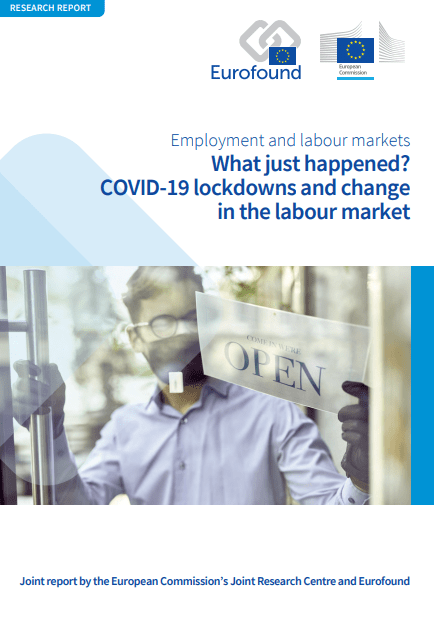
Resumen:La pandemia de COVID-19 cerró o limitó muchas actividades económicas en 2020, con repercusiones de gran alcance en el mercado laboral. Las pérdidas de empleo al comienzo de la pandemia fueron más acusadas que las experimentadas durante la crisis financiera mundial. El descenso de las horas trabajadas fue aún mayor como consecuencia del despido generalizado de trabajadores con apoyo estatal. Las políticas de distanciamiento físico de los gobiernos condujeron a otro ajuste significativo y en gran medida ad hoc: el cambio al trabajo masivo a distancia para aquellos trabajadores cuyos empleos lo permitían. Este informe describe la evolución del empleo y del tiempo de trabajo por sectores y ocupaciones durante el primer año de la crisis. Explora qué categorías de trabajadores se vieron más afectadas: principalmente los trabajadores temporales, los jóvenes y las mujeres con salarios bajos. También evalúa hasta qué punto el trabajo a distancia sirvió de amortiguador durante la crisis, preservando puestos de trabajo que de otro modo podrían haberse perdido.
Summary:The COVID-19 pandemic closed or limited many economic activities in 2020, with far-reaching impacts on the labour market. Employment losses at the outset of the pandemic were sharper than those experienced during the global financial crisis. Even greater declines in hours worked arose as a result of the widespread state-supported furloughing of workers. The physical distancing policies of governments led to another significant and largely ad hoc adjustment – the shift to mass remote working for those workers whose jobs allowed it. This report describes the employment and working time developments by sector and occupation through the first year of the crisis. It explores which categories of workers were most affected – primarily temporary workers, the young and low-paid women. It also assesses the extent to which remote working served as a buffer during the crisis, preserving jobs that might otherwise have been lost.
Fecha publicación: 12-11-2021
Autor: Eurofound; Mandl, Irene ; Hurley, John ; Mazzeo Ortolani, Giovanna ; Adăscăliței, Dragoș ; Peruffo, Eleonora ; Fana, Marta ; Vacas-Soriano, Carlos
ISBN / ISSN: 978-92-897-2212-4
Link: https://bit.ly/3qGNDNj
Palabras clave: consecuencia económica , enfermedad por coronavirus , epidemia , Estado miembro UE , informe de investigación , mercado laboral , paro coyuntural , recesión económica , seguridad en el empleo
Keywords: coronavirus disease , cyclical unemployment , economic consequence , economic recession , epidemic , EU Member State , job security , labour market , research report
- Saltar a la navegación principal
- Saltar al contenido principal
- Saltar a la barra lateral principal
- Saltar al pie de página

CDE Almería - Centro de Documentación Europea - Universidad de Almería
Centro de Documentación Europea de la Universidad de Almería